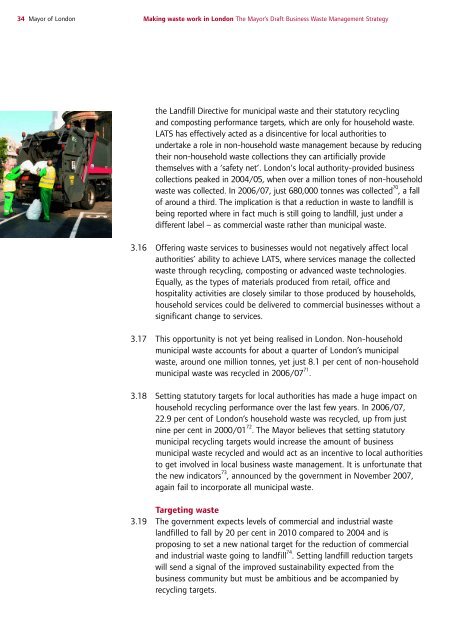Draft Business Waste Strategy PDF - london.gov.uk - Greater ...
Draft Business Waste Strategy PDF - london.gov.uk - Greater ...
Draft Business Waste Strategy PDF - london.gov.uk - Greater ...
You also want an ePaper? Increase the reach of your titles
YUMPU automatically turns print PDFs into web optimized ePapers that Google loves.
34 Mayor of London<br />
Making waste work in London The Mayor’s <strong>Draft</strong> <strong>Business</strong> <strong>Waste</strong> Management <strong>Strategy</strong><br />
the Landfill Directive for municipal waste and their statutory recycling<br />
and composting performance targets, which are only for household waste.<br />
LATS has effectively acted as a disincentive for local authorities to<br />
undertake a role in non-household waste management because by reducing<br />
their non-household waste collections they can artificially provide<br />
themselves with a ‘safety net’. London's local authority-provided business<br />
collections peaked in 2004/05, when over a million tones of non-household<br />
waste was collected. In 2006/07, just 680,000 tonnes was collected 70 , a fall<br />
of around a third. The implication is that a reduction in waste to landfill is<br />
being reported where in fact much is still going to landfill, just under a<br />
different label – as commercial waste rather than municipal waste.<br />
3.16 Offering waste services to businesses would not negatively affect local<br />
authorities’ ability to achieve LATS, where services manage the collected<br />
waste through recycling, composting or advanced waste technologies.<br />
Equally, as the types of materials produced from retail, office and<br />
hospitality activities are closely similar to those produced by households,<br />
household services could be delivered to commercial businesses without a<br />
significant change to services.<br />
3.17 This opportunity is not yet being realised in London. Non-household<br />
municipal waste accounts for about a quarter of London’s municipal<br />
waste, around one million tonnes, yet just 8.1 per cent of non-household<br />
municipal waste was recycled in 2006/07 71 .<br />
3.18 Setting statutory targets for local authorities has made a huge impact on<br />
household recycling performance over the last few years. In 2006/07,<br />
22.9 per cent of London’s household waste was recycled, up from just<br />
nine per cent in 2000/01 72 . The Mayor believes that setting statutory<br />
municipal recycling targets would increase the amount of business<br />
municipal waste recycled and would act as an incentive to local authorities<br />
to get involved in local business waste management. It is unfortunate that<br />
the new indicators 73 , announced by the <strong>gov</strong>ernment in November 2007,<br />
again fail to incorporate all municipal waste.<br />
Targeting waste<br />
3.19 The <strong>gov</strong>ernment expects levels of commercial and industrial waste<br />
landfilled to fall by 20 per cent in 2010 compared to 2004 and is<br />
proposing to set a new national target for the reduction of commercial<br />
and industrial waste going to landfill 74 . Setting landfill reduction targets<br />
will send a signal of the improved sustainability expected from the<br />
business community but must be ambitious and be accompanied by<br />
recycling targets.
















